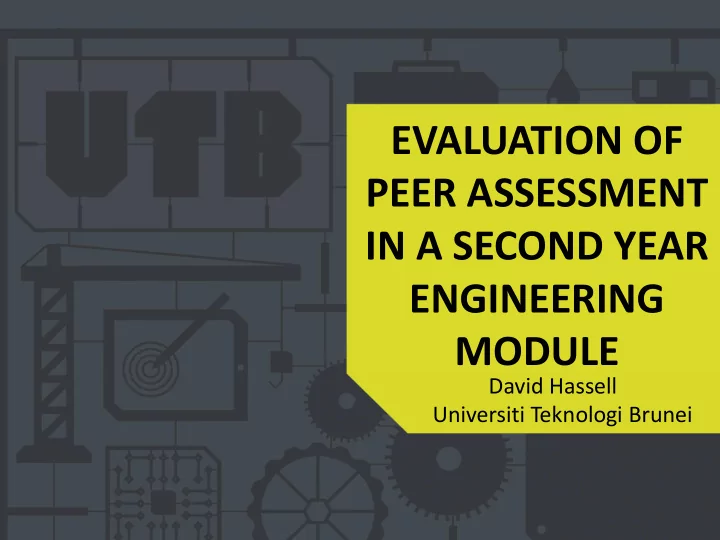

EVALUATION OF PEER ASSESSMENT IN A SECOND YEAR ENGINEERING MODULE David Hassell Universiti Teknologi Brunei
Introduction • Background • Methodology • Results • Conclusions
Background • Universiti Teknologi Brunei officially became a University in 2008 • Petroleum and Chemical Engineering Programme Area (PCE) began in 2009 • PCE currently has ten members of staff teaching two degree’s (CE, PE) and ran a Foundation Degree programme until May 2016 • As PCE develops it is introducing new teaching methodologies
Background • Second Year module: Petroleum Refining • Basics of Petroleum refining, including processes and systems • Qualitative in nature with little numerical calculations • Coursework is in essay form (600 words) • Students asked to research, evaluate and explain the factors involved in locating an oil refinery • Worth 15% of the module • Two student cohorts • Petroleum Engineering degree students (38) • Foundation Degree in Process Engineering students (58)
Methodology Students undertake and submit the coursework • At the end of the semester students are provided • with a Rubric and supporting documentation to assess their work and that of a peer Presentation is given highlighting how to use a • rubrics to assess coursework Students are given 30 minutes per exercise to both • peer and self assess the work Coursework is marked by lecturer and 2 nd academic • marker (non-specialist) and the results compared
Student Perception Questions were asked on a seven point Likert scale* to evaluate student perceptions on the following: – Do students feel that peer assessment is a fair way to evaluate their work and do they think peers have the knowledge to do so? – Do students take the exercise of marking other peoples work seriously? – Do students learn from the process, and if so how? – How do students find the experience? *Likert, R. (1932). A technique for the Measurement of Attitudes. Arch. Psy. pp 140 1-55
Student Perception “I think that the rubrics was “ I think that the presentation given at the beginning of the written in a clear manner class on how to use rubrics which allowed me to prepared me well enough to accurately access the work” assess the work ”
Student Perception “I think rubrics based peer “ I feel that my peers have assessment is a fair method adequate knowledge to to assess student's evaluate my work” performance ”
Student Perception “ I felt that I was critical of “ I took a serious attitude others work when marking towards marking peers' work ” it ”
Student Perception “ Giving feedback to my peers “Giving feedback to my peers is useful to me ” is very difficult ”
Student Perception “I feel that peer assessment “ I learnt something through is helpful to my learning ” performing peer review ”
Student Perception “ I learnt something through “ Giving feedback to my peers performing peer review ” is useful to me ” More people thought they learned from it than thought it useful?
Student Perception “ Peer assessment activity “ I would prefer not to do peer assessment on others ” motivates me to learn ”
Student Perception Students felt that They were adequately prepared to undertake the • assessment exercise The assessment exercise was a useful learning tool • The assessment exercise motivated students to learn • They took the exercise seriously and were critical other • the work they were assessing The exercise was difficult, and they were unsure whether • they would like to peer assess others or not
Marking A comparison of individual marks awarded to students from self-assessment and lecturer assessment – How does self and peer assessment marking compare with lecturer marking and second marking? – Are there any observed trends based on student ability with regards to their self or peer assessment? – Have students learnt from the process?
Marking Can you see any correlation between markers?
Marking Poorly performed students have the tendency to overrate themselves as compared to lecturer’s grading?
Marking High performing students tend to be underrated by peers?
Marking A representative comparison of the exam mark against related question mark But was it just an easy question? - possibly
Marking • No correlation between self, peer or lecturer marking – Poor Rubrics? – Poor implementation? • Do people have the required knowledge? • Do people understand when a point is correct or not? • Difference between student marking and that observed by Sadler and Good, 2006 – Different students – Different culture Sadler, P.M., & Good, E. (2006). The impact of self-and peer-grading on student learning. Educational Assessment, 11(1), 1-31.
Conclusion • Self and Peer assessment was trialed in a second year module for one coursework • Students seemed to find the exercise useful and learned from the experience – Exam results seem to indicate this is possible • Comparison of marks illustrated no match between self, peer or lecturer marking – Poor rubrics, poor implementation?
Recommend
More recommend